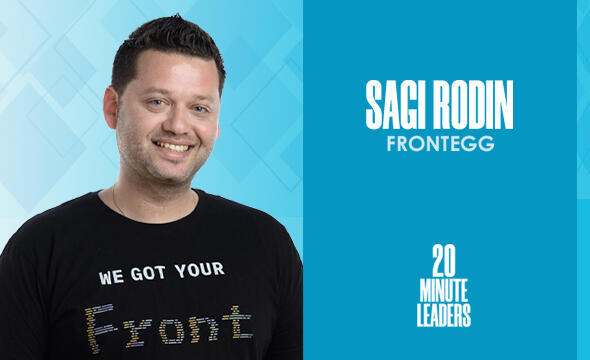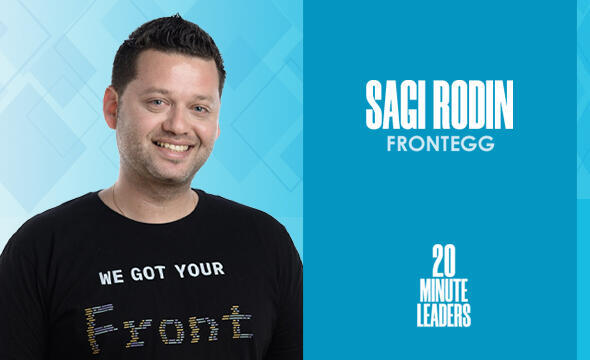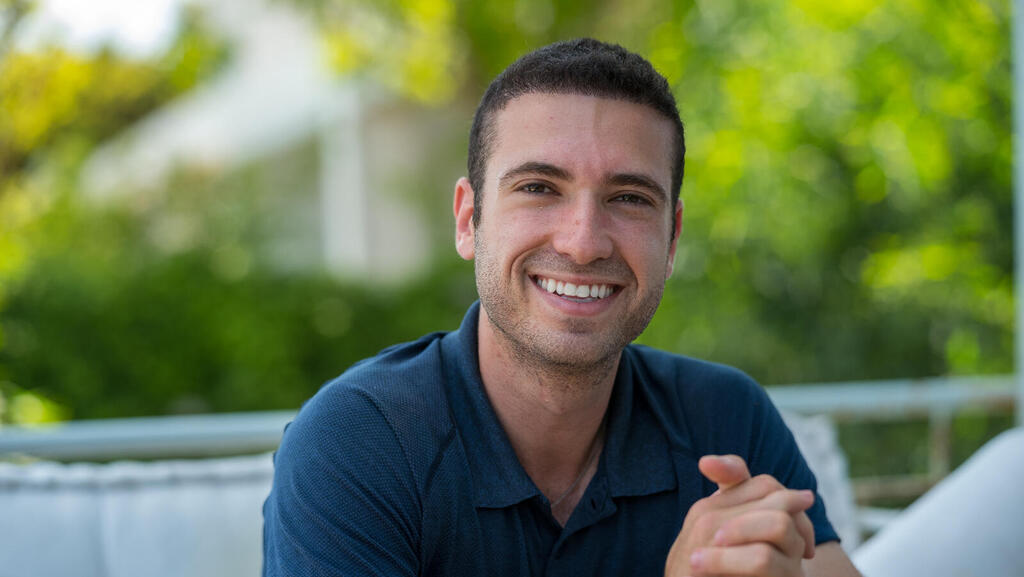
20-Minute Leaders
“We are enabling the acceleration of innovation for our customers.”
The innovation at SaaS companies is slowed by their need to focus on the platform experience and the core of the product, says Sagi Rodin, co-founder and CEO of Frontegg.
The innovation at SaaS companies is slowed by their need to focus on the platform experience and the core of the product, says Sagi Rodin, co-founder and CEO of Frontegg. He shares that innovation can be accelerated with Frontegg, a user management platform that can take care of the experience aspect, letting these companies focus on core innovations. Rodin explains that seeing how Frontegg succeeds in helping these companies is the best feeling for him. The co-founding team had a broad vision for helping B2B SaaS companies turn their ideas into products, and they tried out various components before focusing on the most promising ones. While Rodin had previously managed a larger, multidisciplinary team at Check Point, he says becoming CEO and handling the decisions was a big change. He explains that his success in the role comes from understanding the product and speaking from his heart.
Tell me about Frontegg.
We are growing and seeing a lot of traction and interest in our product. So Frontegg in essence is a user management platform. We are enabling SaaS companies to go to market much faster with a product that meets the standard of modern SaaS applications. Most of our customers would be B2B SaaS companies at different stages. We are aiming for B2B companies that want to bring a great experience for their users, and we are helping them to achieve that by providing product capabilities that they can customize and integrate within their app. Starting from the most basic stuff—authentication, log-in, sign up experience—up to the most advanced self-service management capabilities that they integrate within their product.
You are solving a pain that is emerging due to a new standard that people are expecting off the bat.
I've been developing software and mainly focused on customer-facing software since the age of 16. We were focused on creating great experiences when I worked in small companies and even in a large enterprise before starting Frontegg. What happened in the last 10 years is that you could see a movement from focusing on providing great experience for consumer applications. But when I pitched the idea of providing great user experience in B2B applications, people looked at me five years ago, "What? It doesn't matter.”
Today, the buyers of those software expect a certain level of product experience, of onboarding experience. You see that the borders between a great consumer experience and organization experience were almost erased. Today, you start as a user and then you become a business that buys software.
For great companies to be able to provide both things, the core of their product and those platform experiences, is something that is very challenging. Especially when you are a young team. When you are in the growth stage, you are expected to provide those experiences faster, and the core experiences even faster. You are kind of always in this race. At Frontegg, we are actually solving that SaaS paradox of "Do I invest in the core or do I invest in those platform experiences?"
How do you figure out what things are shifting from a proprietary technology that companies create in-house to now a commodity or a standard that Frontegg will provide to its customers?
No developer ever came to their team leader and said, "I want to develop the next amazing log-in experience." First of all, developers want to do the cool stuff. But the second thing is that there is a lot of responsibility here. We are always dealing with the most sensitive assets of our customers. That would be their usernames, their emails, all of the information. We are handling the audit logs for some of our customers. That means that basically anything that goes on within the product. It makes it really hard for those developers or product teams to develop it in-house and provide a great experience for their customers.
In a world where Frontegg delivers on its milestones and it grows to where you want it to grow, what changes in the world?
I think that a lot of the experiences that 10 years ago, like authentication where I would just develop it in-house, people understand that there is a standard behind it now and that there is somebody that can do it better. More and more experiences like that are becoming standardized. Developers today deal with very tough things to handle. They will find that a lot of those platform capabilities could be provided by people that do that all day.
If today we think about low code or no code as something that competes with developers, I think that a few years down the line, developers will embrace those platforms to help them focus on what they do best and on the more challenging and interesting problems to solve. This is where Frontegg, even today, will lay the foundation to provide those experiences. But as we grow and as the market evolves, we'll provide more and more of those experiences.
You mentioned that you are an engineer at heart. How does this play into Sagi's story?
I fell in love with web development because it touched the end user immediately. So it wasn't only about creating cool APIs that run fast, it was about creating experiences. But I also remember that as a developer, I would suffer from what we call "overgeneralization syndrome." So we do everything very generic. I always wanted things to scale. I always wanted them to be secure and robust from the get-go. But when you build a product, sometimes you just need to focus on what the customer asked for. So this was a kind of fulfillment for me, fulfilling the urge of building developer infrastructure. When we build something like that, everything has to be very robust, very scalable, secure from the get-go.
If you are looking at those early days of founding Frontegg, was it always this clear vision?
We had a theory, but we never claimed that we know the best, so we went and asked. We asked other entrepreneurs about their experience in building their products. They all replied with the same answer. “We always knew how to make our own core innovation. But it was hard for us to make a product out of it.” The productization part was a big challenge for everybody. We started with mapping what are those challenges in building a platform, in building a product. And we started actually to develop small parts of it and saw how the market reacted to those components, then focusing on the components that got the best feedback. I think that that's the only way when you have a very broad vision, to start broad and then focus. Then from that point, you can actually extend it.
How was that shift from engineer programmer to strategist leader, and not just an internal leader but an external leader as well?
In my previous organization, Check Point, I managed a team of 60, 70 developers, product people, QA, support, and it was great. And they asked me, "What do you want to do next?" And I said, "It really depends on what's the product." Going to a cyber industry, for example, I wouldn't be able to be a CEO there. I think that what makes me a good CEO in this business is that I just speak from my heart. It's something that I've been dealing with since I was a kid, basically. So I'm building something that I really understand and can talk to a customer on the same level.
How many people are you?
We are more than 50 people right now and growing.
Not far from the size of the team that you managed at Check Point. What's different?
The difference is you have basically almost no one to rely on. At the end of the day, you are calling the shots. That's, I think, a big leap. It's a great one for me, moving away from your comfort zone.
What do you love most about what you do?
This weekend, a CEO of a great value-based company approached me on LinkedIn. He said, "It just ticked every box that we needed. We already completed the first integration." To hear that from somebody that understands product and hear that we've been able, even in a few days, to accelerate a process for him and now we can innovate faster through our product, that's just amazing. We are enabling the acceleration of innovation for them. When you hear that you succeeded in that, there is no feeling that's better than that.
Michael Matias, Forbes 30 Under 30, is a Venture Fellow at Innovation Endeavors as well as investment Venture Partner at Secret Chord and J-Ventures. He studies Artificial Intelligence and Human-Computer Interaction at Stanford University, and was an engineer at Hippo Insurance. Matias previously served as an officer in the 8200 unit. 20MinuteLeaders is a tech entrepreneurship interview series featuring one-on-one interviews with fascinating founders, innovators and thought leaders sharing their journeys and experiences.
Contributing editors: Michael Matias, Megan Ryan














